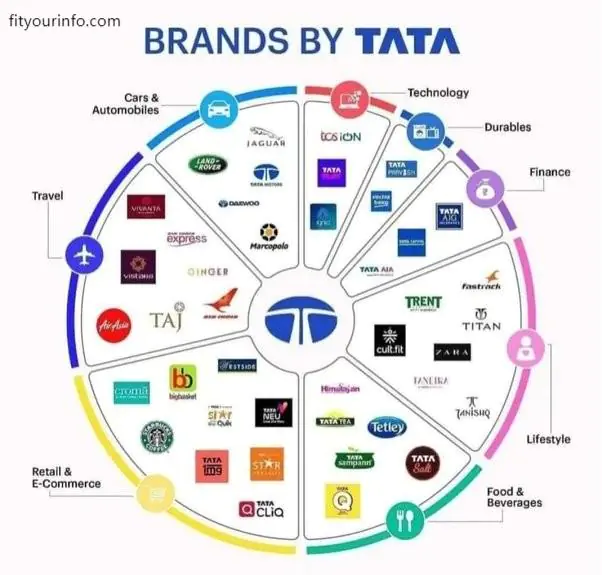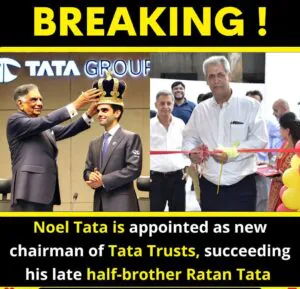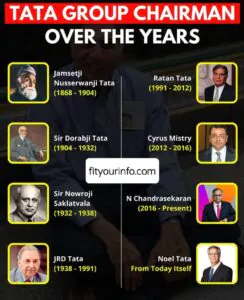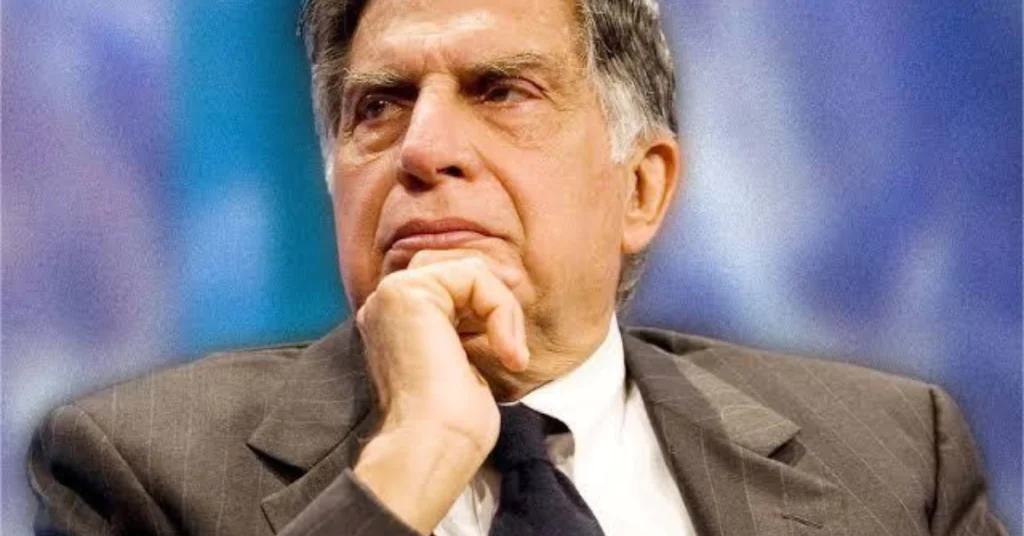Ratan Tata
Ratan Tata was born on 28 December 1937. His father was Mr. Naval Tata. From childhood, Ratan Tata faced lots of difficulties in his life. After the divorce of his parents, his grandmother brought him up. But these challenges never stopped him from becoming the greatest person in India. He got his educational degree from Cornell University situated in Ithaca, New York. In 1961 he returned to India and joined the Tata group. Moving forward, in 1991 when he took over as the chairman of the Tata Sons, everyone would be aware of the changes he brought to the company.
Leadership
Under his leadership, Tata Motors bought Jaguar and Land Rover and turned the loss into profit. Tata bought tiny machinery Tata Steel acquired Corus due to which Tata became a global powerhouse.
But Ratan Tata was able to attain triumph with the help of his warrior mindset.
We all heard about the phrase ‘Revenge’. May assume this phrase means “to punish someone for causing pain”. But Ratan Tata might have a different way of taking revenge.
Just being the name Tata does not guarantee your success, for that, you also have to prove yourself; for that, you have to go through a challenge. In 1962 when Ratan Tata was 25 years old, he returned to India after completing his education and he had to start from the bottom in a seal factory in Jamshedpur. Deserving people feel bad when they do not get work according to their capability, but they take revenge only for learning the right thing even from wrong situations.
He learnt how to handle thousands of employees in the factory and what their problems are. In 1970, the radio and electronics wing of Tata was a loss-making company. But when Ratan Tata became the director, he took the company from a 3% market share to a 20% market share. From this point of view, till he became the chairman of the Tata Group in 1991, Ratan Tata helped in making a loss-making company profitable. Till Ratan Tata was in charge for 21 years, then the revenue increased by 40 and profit by 50 times. Not 50%, it increases 50 times.
Tata motors
But there was a time when Tata Motors was incurring a huge loss, then Ratan Tata reached the USA and he asked for help from the Ford company.
The in charge of the Ford company said “We are favouring you by buying your company, if you don’t know how to make a Dandiya, then why do you try? ”.
Ratan Tata was very upset after hearing this but he kept his anger calm because according to him it was not the correct time to show aggression. He channelled aggression to improve business and in some salons, the situation was completely reversed. This time Ford Motors was running at a loss and to save it, TATA MOTORS reached their place. Jaguar and Land Rover, both are luxury cars by the British company, Tata acquired both of them. But Tata did not stop there, Ratan Tata acquired TETLEY, the world’s second-largest tea-bag manufacturing company and by acquiring a steel-making company with Chorus name for Rs. 12 billion, Tata created the latest International Acquisition by an Indian Brand.
The most famous slogan of Tata was:
“TAKE THE STONES PEOPLE THROW AT YOU AND USE THEM TO BUILD A MONUMENT”.
Taj Hotel
Tata is the 7th largest private conglomerate in the world and this work cannot be done by just one person. Tata Group employs around 7 lakh people. We know how much Ratan Tata sir valued his employees from the story of TAJ HOTEL. You must know the story of the Taj Hotel in Mumbai. It is about the year 1890 when Jamshedji Tata, one of the greatest industrialists of India, one day visited WhatsApp Hotel in Mumbai.
But he was not allowed entry there because there was a sign outside his hotel that read “DOGS AND INDIANS NOT ALLOWED!”.
Then a question came to his mind: why not build a hotel in India on Indian land and give entry to Indians only? Then Jamshedji Tata decided that he would build a hotel 10 times better than that hotel in Mumbai where there would be no such discrimination. In this way, the Taj Mahal Hotel was built in 1903.
After that, just in 2 weeks, Ratan sir established the TPS Welfare Trust which has a victim’s family and paid them salary for their entire lives. The Welfare Trust provides their children with a good education and if they had any outstanding loans they were paid off too.
And not just employees, even the hawkers Who Sold things outside the Taj hotel and their families benefited from TPS Welfare Trust.
In India, 90% of the companies whose startups fail in 5 years. There are only 5 private startups left which continue for the next 10 years. And there are 0.01% of startups which continue for 100 years. Tata Group is one such company which has been running for more than 150 years.
TCS
I started a group which has grown so much that it has more than 100 companies operating in more than 100 countries and has the highest market capitalisation within the country. TCS is the only company so big that the stock exchange of entire Pakistan is on one side and the market cap of TCS is on the other side. Tata per cent solely contributes 4% to the GDP of the country.

To make his group one of the greatest Ratan Naval Tata adopted some business strategies which are:
ORGANIC GROWTH
- New Market
- New Technology
- New Customer
INORGANIC GROWTH
- Takeover
- Acquisition
- Buy Other Companies
- Buy Small Companies
- Joint Ventures
- Partnership
- strategic alliances
EXIT – STRUGGLING BUSINESS
- Cosmetics
- Paint
- Oil
- Soap
- Pharma
- Cement
These are some companies which never held much interest in Mr Ratan Naval Tata
ENTER – POTENTIAL BUSINESS
- Retail
- Telecom
- Biotech
- Technology
HOLD CORE BUSINESS
- Steel
- Motors
- Chemicals
- Power
Now let us discuss some untold stories of Mr Ratan Tata:
Why Ratan Naval Tata did not get married?
So the answer to this question is that he once fell in love with an American woman in Los Angeles. Both of them loved each other deeply. They agreed to marry each other, but suddenly they got a call from India informing him that his Grandmother was very ill and was on death bed. Being the only one who took care of him since childhood, Ratan Tata went back to India. Before returning he told his beloved that she should come to India. They will have a happy married life there.
However, the parents of the women refused to take a leave to visit India as during that time INDO-CHINA WAR was at its peak (1962). Her parents forced her to get married to another person. Little did Mr Ratan Tata know that her love was getting married to someone else. Being the man of the words he kept his promise of not getting married to any other individual hence he remained unmarried for the rest of his life.
According to him
“Loss of time is Loss of money”
- Once Ratan Tata was going from Mumbai to Nashik. He was with many of his senior officials when suddenly the tyre of his car was punctured. All the people got out of the car and started to move to the nearby distance. Suddenly one of the officials noticed that Ratan Tata was missing among them. After looking out they found that Mr. Ratan Tata was working on the tyre, rolling his sleeves to the elbow with a jack and screw measuring the pressure of the tyre. Officials further asked Mr Ratan Tata that it is not your duty to do this work, the driver must take care of the problem related to the car. Why are you doing this? Ratan Tata said that if he can do some work in 15 minutes then why get my help? He could do it in 7.5 minutes resulting in getting 7.5 more minutes in the meeting we are supposed to attend currently.
This was his way of working and his motive. And helping our juniors can help to build a strong base.
“LEADERSHIP IS NOT A POSITION IT IS AN ACTION”
Management Skills
- Crisis management is taught at Howard University. Two professors were sent to India by the Harvard University of Management and they were ordered to go to India the employees of Ratan Tata’s company were asked why they were so committed. Ratan Tata and his company’s people were involved in helping others during the time of crisis.
There was a manager in the Taj Hotel whose name was Karamveer Singh. When he visited the Taj Hotel, his wife and children were in the same hotel. He got the news that his wife had died, who was in a suite room with her children. Even after knowing this, he was busy saving other guests. Not only this, apart from him there were some young trains also who were engaged in saving all the guests. Along with them telephone operators and receptionists were also helping to escort guests safely. Havard was surprised to know how Tata could get this level of commitment from his employees that they are helping others before saving their own lives.
Earlier they thought that Tata was providing great training to its employees to encourage altruism among them. But then they found that training is only possible if the employees are working for a long period in their organisations. And even a new trainee is helping to escort the guests by keeping his life in danger. They further thought about reward recognition but this was also out.
Tata Group
Now the question arises: How is this even possible that every employee of TATA GROUP is willing to keep his own life at stake for the company?
Finally, after interviewing with Ratan Tata they came to know that. This quality is not built after hiring an employee. But this quality is checked earlier which means before hiring an employee. We look after the character, and integrity of the employee during the time of an interview.
INTERVIEW IS THE KEY.
It is during the interview that we take such people in our company who are honest.
According to Mr Ratan Tata, there are two factors in a situation
- the situation itself
- Our reaction to the situation
In our lives, there are a lot of things which are out of our control and focusing on them does not make any sense. How about you focus on yourself? Let’s make ourselves better. Let’s be patient and grow, not by putting others down, let’s take revenge by growing more. He worked on this principle his entire life and hence proved himself as a Gem of India.
Could Tata Group be on the brink of a new era of growth?
Tata Group of companies
The Tata Group is one of India’s largest and oldest companies, founded in 1868 by Jamsetji Tata. Its headquarter is located in Mumbai, India, and operates across various sectors, including:
Steel:
Tata Steel is one of the largest steel producers globally, known for its innovation and sustainable practices.
Automobiles:
Tata Motors manufactures a wide range of vehicles, including cars, trucks, and buses, and is known for the Tata Nano, the world’s cheapest car.
Information Technology(IT):
Tata Consultancy Services (TCS) is a leading global IT services and consulting company, playing a significant role in the IT sector.
Consumer Goods:
Tata Consumer Products encompasses a wide range of food and beverage products, including Tata Tea and Tata Salt.
Hospitality:
The group owns the Taj Hotels, a luxury hotel chain known for its high standards of service and hospitality.
Telecommunications:
Tata Communications is a key player in the global telecommunications space, providing various services, including data and voice solutions.
Chemicals:
Tata Chemicals produces a variety of chemical products, including soda ash and fertilizers.
Aerospace and Defense:
Tata Advanced Systems is involved in manufacturing components for defence and aerospace applications.

Just how big is the Tata Group as a conglomerate?
The Tata Group is known for its ethical business practices, commitment to social responsibility, and focus on community development. It operates with the motto of “Leadership with Trust,” emphasizing sustainability and social impact alongside profitability. The group has a significant global presence, with operations in over 100 countries and a workforce of more than 800,000 employees.
If we look around in our surroundings we will find many products of brand Tata or the other. Let’s say, If we travel by car, we go to Tata Motors and all the vehicles are theirs. If we travel by flight, we go to VISTARA Airlines and AIR INDIA also. If we stay in a hotel, the Taj Hotel is the biggest and most luxurious hotel in the world and it also belongs to TATA. Clothing brands like WestSide also belong to Tata. Starbucks coffee world’s most famous coffee brand belongs to TATA. Tea brand Tetley, Tata tea is also acquired by Tata. Salt is used in food.
In addition to Tata Steel, Tata Power and Tata Consultancy one could not believe that there are more than 100 companies in the TATA Group. So it’s no surprise that currently, Tata is India’s one of the most famous and successful companies.
But do you know that this company did not turn into a giant overnight?
It took them 200 years to achieve success at this level.
Now let’s dive into the knowledge world and get to know the interesting story about India’s oldest business family. The Secrets of Tatas. The TATA Group has pioneered multiple industries in India and remains a market leader in most of them.
Because of Tatas who introduced a number of firsts, the first 8 hour day, the first leave with pay.
The evolution of Tata into a global powerhouse.
- The story begins in the year 1822. Exactly 2 years ago a boy was born in a village in Gujarat to a family of Parsi priests.
- The boy was named Nusserwanji Tata. Since childhood, he was a restless soul. He always had a fire within himself to do something great.
- It was said that he was the only person in his village who strongly felt the need to move out of the village and do something great in order to change his living and make his family proud. He believed that it was his destiny to do something great so when he was just 20 years old he left his village and moved it to Mumbai. But mostly we have seen people move solely from one place to another in order to grow their careers, but Being a father of one child and husband to one woman at the age of 17 he took his family with him.
- He moved from the village to the city to build a new future.
- Soon he was running a cotton export business. The revenue from the business ensured that it was spent on his son’s education not wanting to compromise with his son’s education at any cost. He provided his son Jamshedji with the best education of the time back then it meant an education in English.
- Nusserwanji’s cotton trading business took off really well.
- Later when Jamshedji reached adulthood and finished his education his father decided to send him to Hong Kong for Business expansion.
Education of Jamshedji in 1959
Today it may seem very common for a Businessman to send their children abroad for business expansions. But this was a great task to Remember being done in 1859. It was that time when air travel would not be invented for 55 more years. Back then it was a long and arduous journey by ship. In 1859 when Jamshedji was 20 years old his father slightly won the mission to set up an office in Hong Kong. Interestingly jamshedji was not alone either he was married and had a child. It was not an easy decision to uproot the family and shift to another country. And trying to set up a business there.
But Jamshedji was very ambitious. This led him to immense success. In his 65 years of life, Jamshedji worked on three continents. Started numerous cotton mills in India. Additionally, he laid the foundation for the construction of India’s first steel factory and launched India’s first five-star hotel. The hotel was Mumbai’s Taj Hotel which was actually India’s first ever hotel to have electricity.
Nowadays it is among the most prestigious hotels in the world.
Tata in 1904
In 1904 Jamshedji Tata passed away and left behind a legacy that remains unmatched even now. Nowadays building a profitable business has become quite common, we will find many such businesses, that mostly work for profit. WhatsApp Seth Ji Tata set a reminder Legacy of principles and ethics along with building an Empire. For example in 1874 Jamshed ji Tata set up his first cotton mill in Nagpur this was his first experiment of moving beyond cotton trading and entering the cotton production business. Whenever we set up a new business, we encounter a new type of problem.
Similarly, the problem was also encountered by Jamshedji Tata. He saw that labourers working in the Cotton mill in Nagpur were very lazy. They would make a reason for being absent; they would not come to work during the daytime. 100% attendance of the workers and labourers working at this mill had never happened.
The work culture at Tata in the early 1900s was remarkably progressive, shaped by the visionary leadership of Jamsetji Tata.
Usually, a supervisor in the situation will threaten the workers with the termination of employment due to absenteeism. He would reprimand the workers, but Jamshedji Tata’s actions were contrary to common practices. Assume that there would be some reason for the laziness of the labourers. Since he wanted to motivate them he looked for a long-term solution for tackling this problem. Then Jamshedji Tata created a general provident fund for them to ensure that these labourers continue to get pensions even after retirement. Apart from this, Jamshedji started an Insurance Scheme for Tata Nain in case any worker met with an accident, the medical cost would be borne by the company.
Not only this he started family days, sports days, so that the workers could bring their family together, and form a stronger bond among each other to foster a sense of community. These might be quite common in today’s world but keep in mind the era in which this was being done. In the rest of the world during the 1800s the working conditions used to be terrible. There were a lot of cases of communism and capitalism during that time period. But even at that time, Tata was bearing all these expenses out of his fund in order to maintain a good relationship and working environment for the employees.
The evolving future of the Tata Group.

The Tata Group has had several chairmen over the years but under the leadership of Ratan Tata, the company’s growth was unparalleled. His visionary leadership transformed Tata into a global powerhouse, driving significant expansion across multiple industries and acquiring prominent international brands, solidifying its position as a leading conglomerate worldwide.
After the passing of Ratan Tata, questions arose about who would take ownership of the Tata Group. However, it’s important to note that the Tata Group is primarily owned by Tata Trusts, charitable organizations that control the majority of the company’s shares. Ratan Tata himself has no personal ownership of the group, and the leadership transition would focus on appointing a new chairman rather than an individual owner.
Choosing the right chairman for the Tata Group is a critical decision, as the role requires a leader with vision, integrity, and a deep understanding of the company’s values. A person like Natarajan Chandrasekaran, the current chairman, seems to be a strong fit. His leadership at Tata Consultancy Services (TCS) and his proven ability to steer Tata Group through complex challenges show that he has the expertise and insight needed to uphold the legacy of the Tata Group while driving future growth.
Who do you think would be the ideal chairman to lead the Tata Group into the future? Feel free to share your thoughts!


